A day in the life of a trainee guide dog
and live on Freeview channel 276
In an industrial estate in Atherton sits a massive training complex for the charity Guide Dogs, which helps support the blind and visually impaired. Guide dogs are a lifeline for those with sight problems and there are thousands across the country that help people retain their independence, improve their confidence and boost mobility.
To see how the dogs get in shape ready to match up with their new owners, we went down to the Guide Dogs Regional Centre North West on Gibfield Park Avenue in Atherton.
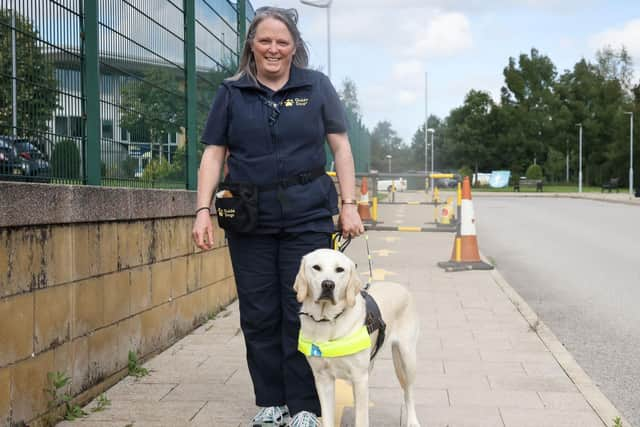

Advertisement
Hide AdAdvertisement
Hide AdThe centre itself surrounds an activity space where dogs learn to avoid obstacles, pick out chairs for their owner to sit on and go through the basic first steps. Dogs will then take to the outdoors where there are faux traffic lights, zebra crossing and pavements littered with blockades to simulate day-to-day scenarios for the guides.
Dog trainer Vicki White said: “The core aspect of our job is to teach the dog the basic skills which initially start with behaviours. This would become the foundations of what it means to be a guide.
“On average we look at between six to nine months of training. That covers every aspect of what a dog needs to learn before they get matched with a potential new owner.
“The matching process comes through various factors such as their walking speed, height, workload and what they want the dog to give them mobility for. The dog is then taken to spend time and meet the owner and do practice on the routes they are familiar with.
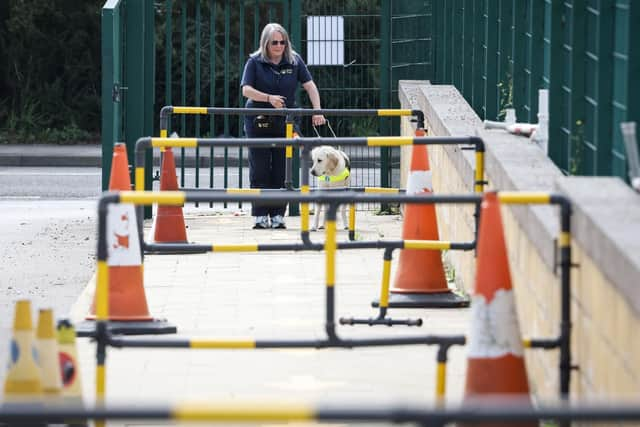

Advertisement
Hide AdAdvertisement
Hide Ad“There are some that are super confident and enjoy Manchester city centre for example, or those that enjoy a quieter lifestyle like popping to the local shops and back. It is very much a case of the dogs being individuals and we treat them as such.
“We try to match them to the right person with the right workload for that dog.”
We were shown a lesson by trainer Vicki and Hilda (a Golden Retriever x Labrador) on managing artificial off-curb obstacles. These mimic when there is a blockage on the pavement.
The 20-month-old canine stopped, weaved and steered Vicki past the blockages, whilst pausing on the curb to indicate a trip hazard. Each time she avoided a blockage, Hilda was awarded a tasty treat.
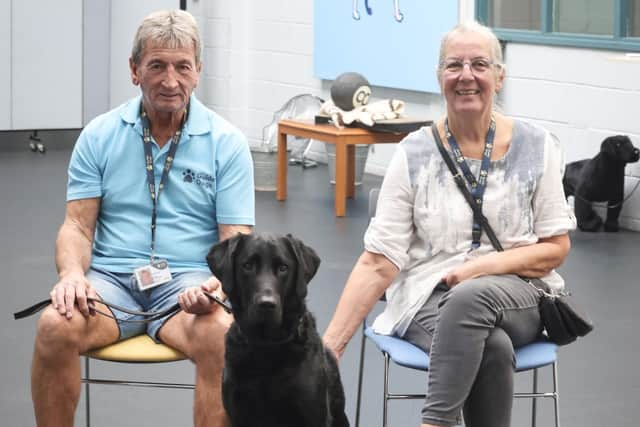

Advertisement
Hide AdAdvertisement
Hide AdMuch like school, the trainee dogs are dropped off in the morning by their fosterers, go through lessons, enjoy break times in the fields and play area – so they become the best they can be. At the end of the day they are picked up and go home for rest and relaxation.
Like many charities, volunteers play a vital role in the process for these clever creatures, so Guide Dogs are always on the lookout for fosterers who can provide a home for their dogs as they train. Local to the Leigh area, Terry and Margaret Pemberton are keen foster parents and currently house Charlie, who is a 21-month-old Curly Coated Retriever x Labrador.
Each morning they drop off their beloved trainee – who has been their fifth with the charity – and pick him up at home time.
“Charlie is brilliant in all respects,” Terry said. “The lovely thing about having a guide dog like Charlie is that when we go out walking with him at weekends, he has the time of his life, he runs, his recall is excellent, no hesitation whatsoever.
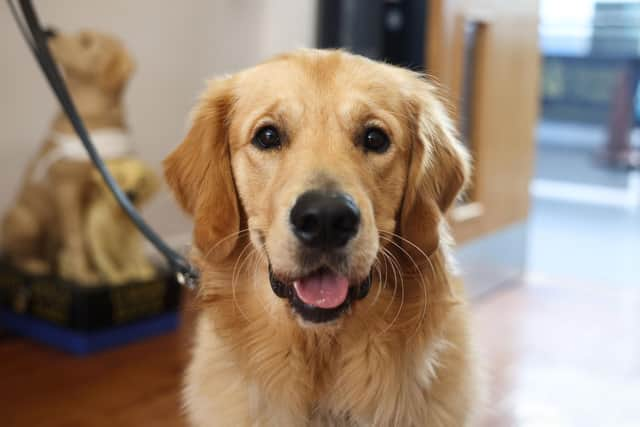

Advertisement
Hide AdAdvertisement
Hide Ad“He comes in at 8am and we pick him up at 3pm. If we have any problems, like we can’t pick him up or drop off, the trainer can come and collect him or drop him off – there is no issue with that.”
Margaret added: “We look after him on evenings and weekends. We are his playtime, which is absolutely brilliant.
“The first week of lockdown we had to put our dog to sleep, we tried everywhere to get a new dog and then one of our friends who has dogs on the fields said ‘these are guide dogs you know’. She said, ‘Why don’t you think about fostering a guide dog?’, and the rest is history.”
“We got Charlie this time and we fell in love. He will be going to his forever home soon to match with a new owner.”
Advertisement
Hide AdAdvertisement
Hide AdThe couple admitted that although it is tough to watch the dogs go, they know they have an important job to do and it brings them great pride to see them go on and succeed. Despite getting attached to the dog, when they move on “they are giving someone independence, confidence to go out in the world and do good, and that is the only thing that keeps us going,” explained Margaret.
The bar for a guide dog to pass is high, as they play such a key role in the life and safety of the visually impaired. So when dogs do not quite make the cut and it is deemed working life is not for them, other avenues – such as Buddy Dogs for young children with sight problems or just regular house pets – are found for them.
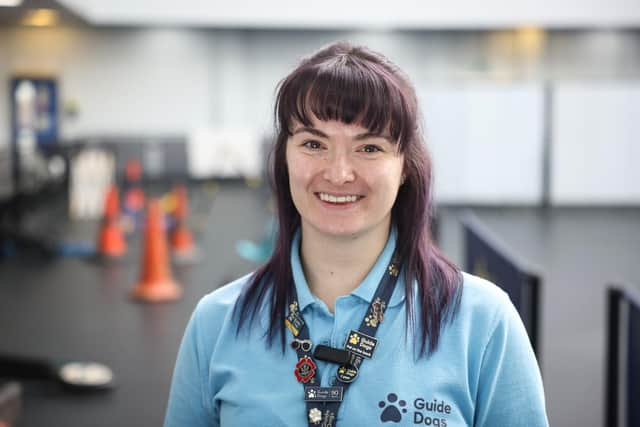

Guide Dogs have their own breeding programme where they get their puppy stock from. Once they are socialised and get basic training with the puppy raisers, they move onto full guide dog training. The volunteer puppy raisers help in the early stages of the dog’s life with basic training for the puppies as well as socialising them.
But caring for individual dogs is not the only voluntary role people can sign up to, with jobs in fundraising, admin and event organisation on offer. Hannah Laidlaw, volunteering coordinator at Guide Dogs, explained that volunteers have a huge impact on what the charity does, and they could not help the thousands of people they have done without them.
Advertisement
Hide AdAdvertisement
Hide Ad“We did a lot of recruitment for puppy raisers last year and now we are getting to the point where they are coming in for their formal training,” she told the M.E.N. “So now we are looking for people who can look after them in their homes.
“If someone is interested in the foster role, the website has a lot of information about what happens day in and day out. Once they have applied and gone through the recruitment process we offer a basic foster training, so it doesn’t matter if they’ve had a pet dog before or not.
“We then match them up with a suitable dog to match their lifestyle. The standard time fostering a dog is around six months but it completely depends on the dog.
“Some have them for shorter terms for holiday respite care, but some who are training for a longer process will have them for a bit longer.”
Advertisement
Hide AdAdvertisement
Hide AdThe matching process involves a home check to make sure the house matches the dog’s personality – for example a dog that does not like travelling would not go to a home far away. For fosterers, the charity Guide Dogs covers the cost of all the food, veterinary care and equipment required for each dog and provides full training and support.
“If you ever hear one of our guide dog users speak about the dogs, they say it has completely changed them as a person,” Hannah added. “It has helped their mental health, confidence, independence, working – it helps with family life.
“It is hard to put it into words the lifeline it provides and our volunteers love being a part of that.”
The dogs obviously make a huge impact across the country, but the organisation has become a home to many of their workers, who have given their lives to this life changing work. Dog trainer Kim Winstanley has been with Guide Dogs for more than 30 years, starting off as a work experience.
Advertisement
Hide AdAdvertisement
Hide AdKim is still as dedicated today as she was all those years ago. She even admitted she still sheds a tear of joy when she sees her dogs, such as Princess (a two-year-old Black Labrador x Golden Retriever), do incredible things.
“Growing up we had dogs and I lived close to a centre in the south of the country,” Kim said. “I got involved in the dog training and went along to do the work experience, it was just helping people through the dogs, rather than just doing dog training.
“I visited a lady once a week at school (with visual impairment) and saw the problems she had but she was making me cups of tea. I was thinking, you can’t see anything, how are you doing that – she had an older guide dog.
“This is all I have ever done really. It is not just the independence they give people, it is the companionship.
Advertisement
Hide AdAdvertisement
Hide Ad“They get the companionship of the dog as well as everything else it brings such as taking them for a walk in the woods. One dog I trained, the difference in the woman when she got the dog was that she was even walking more confidently. It is just the difference they can make to people’s confidence.
“It makes me proud to work for Guide Dogs. People always ask if it makes me sad when they go, but I say ‘no, because they are going to make a difference’.
“It is like your child going off into the world to do some good. Even now, after all this time, when a dog does really well – I can still be amazed by them.”
Kim truly believes the dogs enjoy the training process and making it fun for them is integral to how they upskill them. Adding fun, as well as the kibble, makes these dogs and the trainers that handle them, the best at what they do to change lives.
Advertisement
Hide AdAdvertisement
Hide AdGuide Dogs are currently on a recruitment drive for dog fosterers. The charity is keen to hear from people who live or work close to the training site at Gibfield Park Avenue in Atherton, but they will also accept applications from further afield if people are able to commit to travelling to Atherton to drop off and collect a dog.
If you think you could provide a loving, temporary home for a trainee guide dog, visit www.guidedogs.org.uk/fosterer or call 0800 781 1444 for more information about how you can get involved.